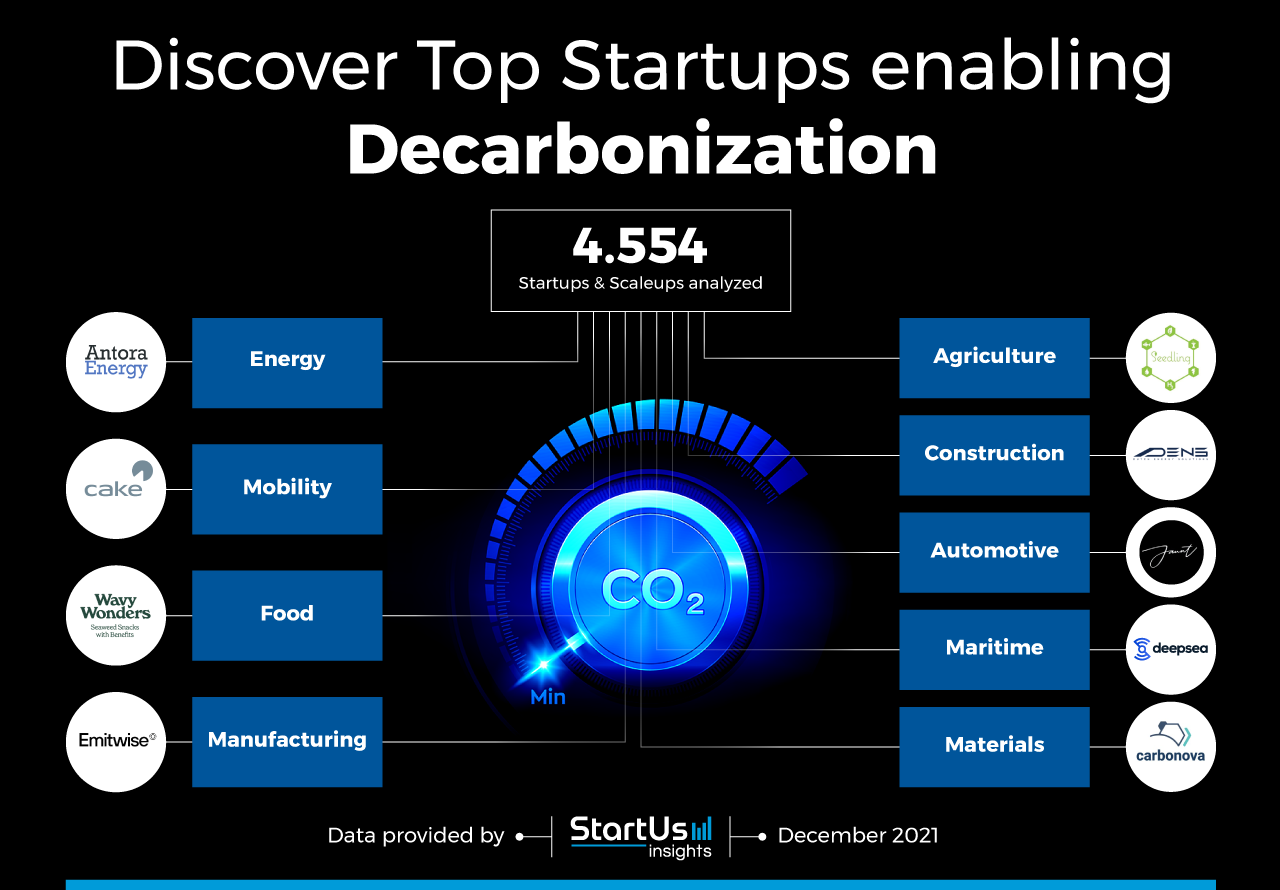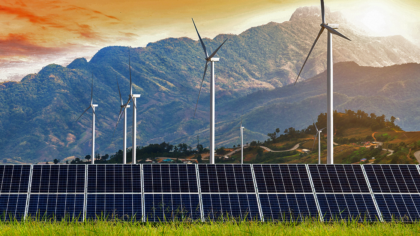Staying ahead of the technology curve means strengthening your competitive advantage. That is why we give you data-driven innovation insights based on our analysis of 4 554 startups enabling decarbonization. This time, you get to discover decarbonization trends across 9 different industries and 9 hand-picked startups advancing the shift to a greener future.
Innovation Map highlights Global Startups enabling Decarbonization
For this in-depth research on the Top Decarbonization Trends & Startups, we analyzed a sample of 4 500+ global startups and scaleups. These insights are derived by working with our Big Data & Artificial Intelligence-powered StartUs Insights Discovery Platform, covering 2 093 000+ startups & scaleups globally. The platform quickly delivers an exhaustive overview of emerging technologies within a specific field as well as identifies relevant startups & scaleups early on.
In the Innovation Map below, you get an overview of the 9 industries that are adopting decarbonization as well as 9 startups enabling the trend. This research gives you data-driven innovation intelligence that improves strategic decision-making by giving you an overview of emerging technologies & startups increasing transparency and productivity.
Decarbonization Technologies & Startups
1. Energy
The energy industry is one of the largest emitters of greenhouse gas emissions. The transition from fossil fuels to renewable energy solutions like solar and wind energy is spearheading the decarbonization of the industry. Onsite renewable energy generation allows companies and individuals to decrease their carbon footprint. Further, startups are producing carbon neutral fuels to enable net zero energy production. Decarbonization solutions in the energy industry include:
- Renewable Energy
- Carbon Neutral Fuel
- Carbon Free Energy
- Net Zero Power Plants
- Flameless Generators
Antora advances On-Demand Renewable Energy Storage
Antora is a US-based startup developing an energy storage system that ensures access to reliable and affordable renewable electricity. It combines low-cost, earth-abundant materials with a proprietary power conversion technology to store intermittent energy as heat. The startup’s thermophotovoltaic engine converts this heat back into electricity on-demand, delivering zero-carbon energy to consumers. The system is also capable of discharging the heat directly for use in industries or residential heating.
Meet 5 out of 600+ energy solutions enabling decarbonization.
2. Mobility
Decarbonization in the mobility sector is akin to that in the energy sector in the increasing shift away from fossil fuels. Electric fleets for vehicles ranging from bikes and cars to trucks make mobility more carbon neutral. Advances in batteries, such as hydrogen batteries, and engines are further enhancing the energy utilization of electric vehicles (EVs). For existing vehicles, dual-fuel systems and other retrofit solutions enable quicker adoption of green mobility. Decarbonization in the mobility sector is driven by solutions such as:
- Fleet Electrification
- Electric Bikes
- Green Hydrogen
- Dual-fuel Systems
- Sustainable Last-mile Delivery
Cake develops Off-road Electric Bikes
Cake is a Swedish startup that develops high-performance electric two-wheelers. The startup’s bike has a modular design that reduces the number of moving parts and minimizes complexity. Cake provides the provision for adding heat and cold boxes enabling the use of their bikes for high-end food and courier delivery. In this way, Cake’s bikes help decarbonize the mobility sector in difficult terrains.
Find more about 5 out of 500+ mobility startups furthering decarbonization.
3. Food
Food production generally involves large amounts of resources, making it unsustainable. Moreover, much of the food is wasted, making it even more energy inefficient. To overcome this, startups are developing alternatives ranging from vertical production to cellular agriculture. These alternatives reduce the footprint of food production, enabling cities to produce food locally. As consumers grow increasingly conscious of sustainability, food startups leverage carbon accounting to ensure that their products are low or zero carbon. Some decarbonization solutions in the food industry include:
- Low Impact Seafood
- Low Carbon Meat Production
- Seaweed-based Food
- Vertical Farming
- Emission Tracking
Wavy Wonders produces Low Carbon Snacks
Danish startup Wavy Wonders produces seaweed-based snacks that are both nutritious and eco-friendly. The startup uses sustainably sourced seaweed and combines it with seeds like chia, flax, sesame, and quinoa to create snacks in three flavors. Seawood also has the ability to sequester carbon, reverse ocean acidification, and grow with no added fertilizer. The carbon capture ability of seaweed reduces the overall carbon footprint of the snack as well. This results in an environmentally friendly snack that is rich in protein, fiber, omega-3, and iodine.
Find more about 5 out of 500+ startups enabling decarbonization in the food industry.
4. Manufacturing
The manufacturing of most products uses fossil-derived or polluting raw materials. Wasteful and energy inefficient processes also increase the carbon footprint of manufacturing units. To meet sustainability standards, manufacturing startups are switching to greener materials as well as adopting circular economy principles such as recycling and reuse. Further, tracking emissions throughout the product lifecycle identifies manufacturers to identify which processes need more focus. Few solutions advancing decarbonization in the manufacturing industry include:
- Carbon Dioxide Conversion
- Battery Recycling
- Green Graphene
- Direct Air Capture
- Sustainability Tracking
Emitwise offers a Carbon Accounting Platform
Emitwise is a UK-based startup providing a carbon accounting platform for sustainability tracking. It collects data on the direct and indirect greenhouse gas emissions and removals as well as calculates the carbon dioxide equivalents. It allows businesses to measure, report, and reduce the carbon footprint of their operations and supply chain. The solution also automates this data collection. Furthermore, Emitwise creates dashboards that identify carbon hotspots, set targets to reduce them, and track sustainability progress easily and clearly.
Take a deep dive into 5 top manufacturing solutions advancing decarbonization out of 294.
5. Agriculture
The agriculture industry uses large amounts of usable land and resources is one of the largest emitters of greenhouse gases. The use of synthetic agrochemicals also pollutes the soil and water, threatening ecosystems. Further, pests and operational inefficiencies cause wastage of large amounts of agricultural produce in the fields, in storage, and during transport. Agriculture startups looking to decarbonize the industry address one or more of these challenges. Some agriculture decarbonization solutions include:
- Precision Agriculture
- Automated Aquaculture
- Low Carbon Greenhouses
- Sustainable Feed Supplements
- Cellular Meat Production
Seedling advances Circular Agriculture
Seedling is a US-based startup that facilitates circular agriculture. The startup’s SEED installation combines aquaponics, precision fertilizers, and hydrology with multi-sector utilities to generate closed-loop value streams. Since the solution utilizes hydrogen-based energy and upcycles food waste, the agricultural carbon footprint decreases substantially. Besides, the modular SEED installments decentralize agricultural economic growth in both rural and urban localities.
Explore our analysis of the 5 top agriculture decarbonization solutions out of 900+.
6. Construction
The construction industry accounts for more than a third of global greenhouse gas emissions. To address this, startups are developing sustainable building materials as well as incorporating circular economy approaches by reusing and remanufacturing building parts. Construction startups also offer material and design solutions that increase the sustainability of buildings over their lifetimes, further reducing emissions. Some construction solutions enabling decarbonization include:
- Zero Emission Onsite Energy
- Low Carbon Concrete
- Ecofriendly Paper Panels
- Concrete Binders
- Emissions Analysis
DENS develops Zero-Emission Liquid Fuel
Dutch startup DENS develops zero-emission liquid fuel to supply power at any location in construction sites. The startup’s DENS Hydrozine is a power generator that supplies energy using hydrozine, a liquid hydrogen carrier. The user-friendly generator generates hydrogen from the formic acid and directly converts it into clean electrical energy in a fuel cell. The system does not produce any harmful emissions, which makes it a sustainable and silent alternative for diesel-powered generators.
Read our data-driven analysis of 5 out of 200+ startups decarbonizing construction.
7. Automotive
The automotive industry’s massive carbon footprint is majorly due to its heavy reliance on fossil fuels. To decarbonize the industry, startups are enabling the transition to electrification. Electric vehicles improve the sustainability of the automotive sector as well as the energy sector with vehicle-to-grid (V2G) solutions. More recently, automotive startups are adopting the use of green hydrogen with the development of hydrogen-powered EVs. Some automotive decarbonizations solutions include:
- Renewable Diesel
- EV Retrofit Technology
- Electric Motors
- Electric Cars
- Hydrogen-Powered Vehicles
Jaunt Motors enables EV Retrofitting
Australian startup Jaunt Motors provides EV retrofitting for Land Rovers models from 1958 to 2015. The startup replaces internal combustion engine and fuel, exhaust, and radiator systems with readily available EV parts. It assembles electric motors, charging and regenerative braking systems, batteries, as well as power steering from other manufacturers. For instance, it uses Tesla battery packs and Netgain electric motors. In effect, the startup’s EV retrofitting enables users to transform conventional vehicles with quality EV parts at low costs.
Get to know the 5 top automotive startups out of 900+ solutions enabling decarbonization.
8. Maritime
With much of global commerce reliant on maritime operations, the industry has a massive carbon footprint. Maritime startups are developing solutions to reduce emissions as well as improve efficiency. These include the development of green propulsion technologies, fuel optimization, and improvements in hull efficiency. Some maritime decarbonization solutions include:
- Vessel Emissions Tracking
- Modular Hydrogen Fuel Cells
- Port Call Optimization
- Fuel Efficiency Optimization
- Sustainable Propulsion Tech
DeepSea Technologies enables Vessel Emissions Tracking
Greek maritime technology startup DeepSea Technologies provides a vessel emissions tracking solution. Cassandra, the startup’s product, is an AI-powered vessel monitoring and optimization platform that enables users to gain an understanding of the vessel’s daily carbon dioxide (CO2) emissions. The platform also assists in decarbonizing the vessel and fleet by optimizing fuel usage and component performance.
Learn about the 5 top decarbonization solutions out of 100+ in the maritime sector.
9. Materials
Since materials find use in all industries, reduction in carbon footprint in the industry has far-reaching effects. To this end, materials startups are replacing petroleum-based materials with biobased materials including those derived from waste feedstocks. Circular solutions that reduce or repurpose material waste also lower the industry’s footprint. Some materials startups advancing decarbonization include:
- Low Carbon Composites
- Biochar Additives
- Material Sustainability Data
- Low Carbon Building Materials
- Sustainable Nanofibers
Carbonova makes Carbon Nanofibers
Canadian startup Carbonova develops technology for the high-volume production of carbon nanofibers. The startup’s production technique utilizes huge amounts of greenhouse gases like carbon dioxide and methane feedstocks and turns them into sustainable nanofibers. It recovers and recycles the excess heat and uses a special catalyst that reduces the energy consumption to decompose carbon dioxide and form carbon nanofiber. This way, the startup recycles greenhouse gases from landfills, biomass, and natural gas reservoirs to produce carbon-negative nano additives.
Discover the Latest Decarbonization Startups
Every day, new startups and technologies emerge that advance decarbonization technologies. These solutions span a range of applications across the industries ranging from mobility and energy to construction. Circular economy and sustainability trends are also advancing the decarbonization of industries. To move away from the reliance on fossil fuels and tackle climate change, startups are incorporating low carbon and zero carbon technologies in their businesses. Get in touch to identify specific startups & solutions that allow your business to take the step towards decarbonization.









